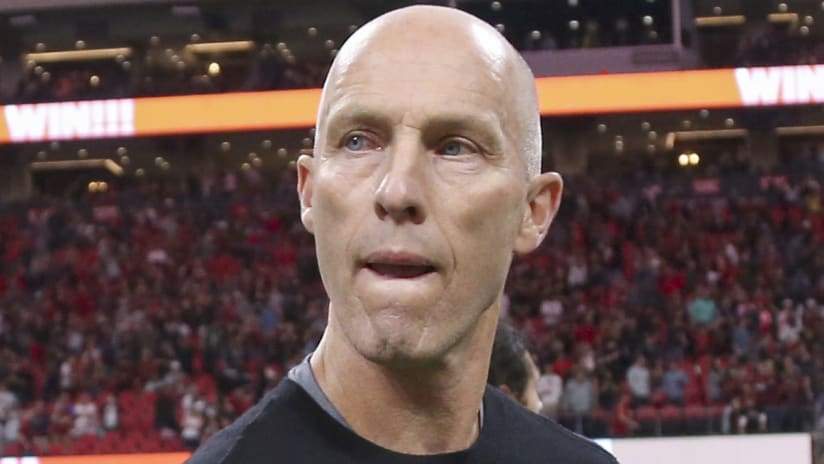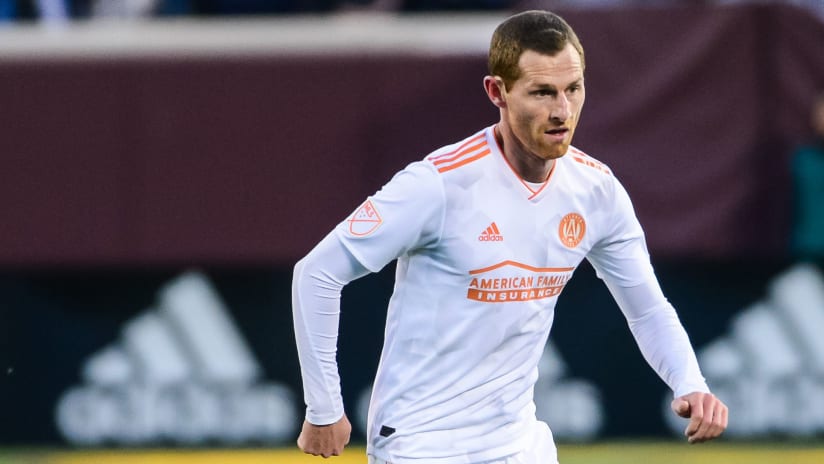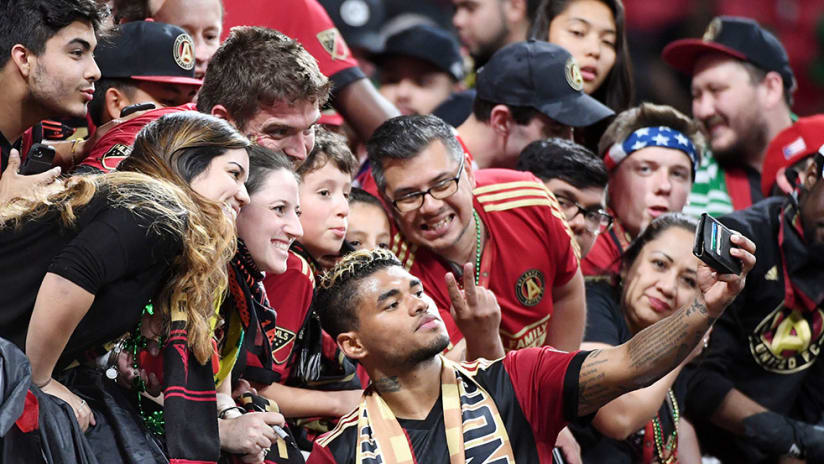For every epic comeback, there is a team on the other side, a group of players who felt the brunt of a heartbreaking lost.
While the LA Galaxy strung together four goals we will never forget, Los Angeles Football Club lost a three-goal lead. The attention around Zlatan Ibrahimovic has shielded LAFC from attention on the other side of the story, the capitulation.
But as the saying goes, there’s no rest for the weary. LAFC must move on from last weekend’s defeat and go to Atlanta United on Saturday (5 pm ET; ESPN — full TV & streaming info).
How does a team recover from giving up a three goal lead in such a big game? Twist the narrative to highlight the positives.
Directly after the game, everyone in the locker room is shocked and angry and nobody feels like talking or listening; the coaches keep the postmortem short and surface-deep. The next day, the head coach starts the practice with a meeting. He provides a simple message: it wasn’t as bad as it felt. Yes, we lost. But at one point, we were up 3-0. And to get up three goals, we were pretty dang good.
As LAFC captain Laurent Ciman explained on LAFC.com, once you rebuild that confidence, then you can talk about the mistakes. "We played 60 very good minutes that we were in control. And then there were 30 minutes where we have to go back, review, and make sure those minutes don’t happen again."
LAFC don’t need to make major adjustments. Rather, there is one key lesson to take from the second half. After the game, LAFC head coach Bob Bradley told reporters, “The most important thing for us is that there are moments in football games you have to be resilient...At that moment we need to find out ways to playing the football we [want].”
To be resilient means to be able to withstand or recover quickly from difficult conditions. Sometimes we identify resilient as a trait of mental toughness, which it is, but it’s also more than that. You also need to be able to solve problems. Generally, identifying the problem is tougher than working through it.
There wasn’t anything obvious about what happened to LAFC. They were in control until they weren’t. But the hard part of being a manager is picking something and knowing you may not be right but going with it. Bob Bradley and his staff will have spent the week trying to identify the problems, so I did my best as well.
Three of the four Galaxy goals came through a similar set of decisions from LAFC players.
The first goal came from a turnover deep in LAFC’s end. Benny Feilhaber received a pass and Galaxy midfielder Servando Carrasco stripped him. Moments later the Galaxy had their lifeline.
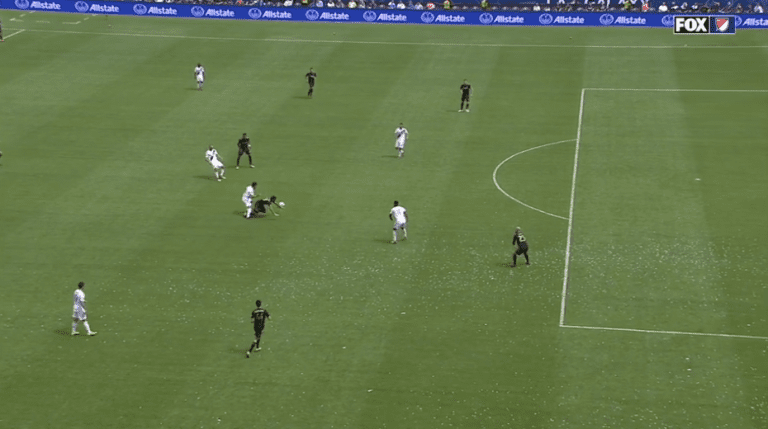
Carrasco forces the turnover on Feilhaber
On the second goal, all three LAFC center midfielders -- Feilhaber, Mark-Anthony Kaye and substitute Eduard Atuesta -- were within 15 yards of the Galaxy 18-yard box, leaving a giant gap between in front of the LAFC center backs. Ola Kamara got the ball unimpeded in space and started the counter that ultimately led to the goal.
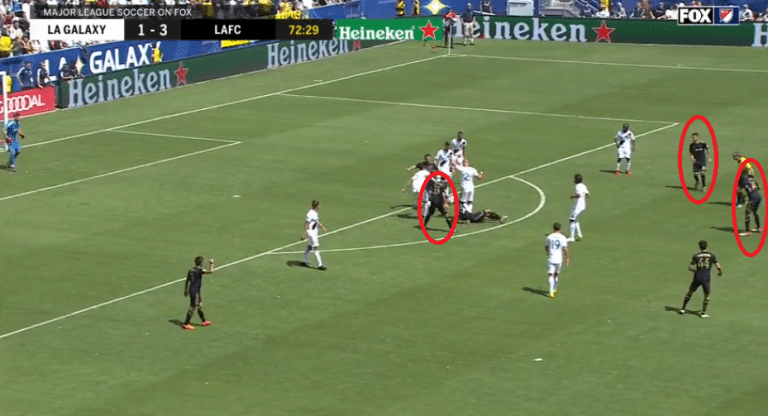
LAFC's deep midfielders just outside the Galaxy's 18-yard box
On the third goal, well, that was just Zlatan and you can’t really say anything else.
For the fourth goal, the Galaxy attack started with a turnover in midfield by Atuesta. Beyond that, the Galaxy transition gained steam after a layoff from Kamara to Baggio Husidic in which Atuesta was still behind the ball.
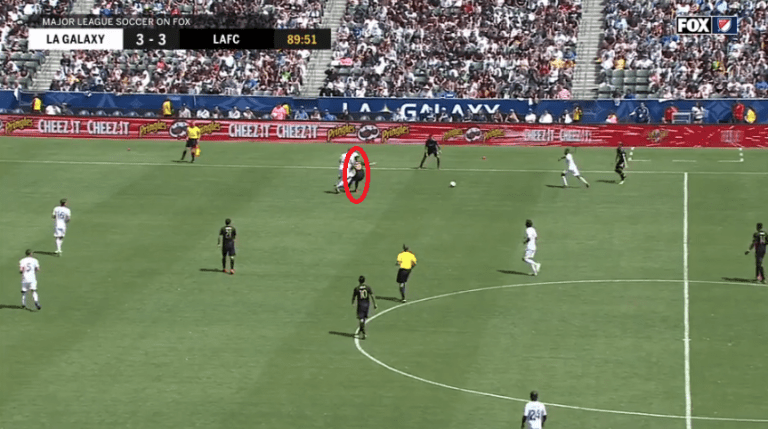
Atuesta's giveaway opens the path for the winning goal
Notice a common theme?
On all three goals, LAFC prioritized attacking over defending.
The simple response would be, “But LAFC had the ball!” Unfortunately, as we all know, when you have the ball is often when you’re most vulnerable. The more you have the ball, the more you expose yourself to counterattacks.
Sometimes when you’re in possession, you still need to prioritize the defensive demands, especially when you’re up multiple goals. Maybe a player doesn’t check for a ball because retaining possession isn’t as important as keeping Ibrahimovic marked.
When the Galaxy started to get control of the game, LAFC needed to adjust their mindset, specifically in the center of midfield.
Feilhaber and Kaye had been great through the first five halves of the season. In the second half against the Galaxy, however, they struggled. Both players are possession-based, better at the attacking phase than the defending elements. They predicate their actions on how to attack rather than how to defend.
In the Galaxy game, we saw the good and the bad of the approach. When LAFC were dominating, they seemed impossible to stop. In the second half, though, LAFC could never really get hold of the ball. Specifically, the Galaxy won second balls in the middle of the field, allowing them to continue their attacking moves.
At times, the center midfielder, as the main anchor of the team, needs to identify the moments when the game isn’t going his way. You need to switch your brain from “I need to get on the ball and help us pass” to “I need to help us limit the damage and survive these 15 minutes.” Resilience. In that situation, you focus primarily on blocking passing lanes and winning second balls. Kaye and Feilhaber never really did either, and the Galaxy put wave after wave of attack together.
It’s not an easy fix; like most things, it’s a catch-22. Sometimes if you decide to play too conservative, you allow the other team too much freedom to attack. For LAFC specifically, Bradley has set his team set up to possess the ball and defend high up the field -- largely, integrating their attacking and defending philosophies together -- and that style got them to 3-0, so it’s tough to change the approach.
Atlanta this weekend provides another clear test. Atlanta's Miguel Almiron, Darlington Nagbe, and crew are good in both possession and transition. Both situations, for the opposing team, demand intelligence and discipline from the defensive midfielders. Every time Feilhaber moves to receive a pass, he will leave Almiron more space in front of the LAFC defenders. There are times when you need to possess the ball and times when you need to stay solid defensively, and it’s a player’s job to identify those moments. You don’t need to bunker; you simply need to adjust your decisions.
It’s all part of the learning curve for LAFC. I suspect Bradley isn’t too stressed. Rather, it’s an opportunity to teach. He doesn’t need to panic and find a new player in the spot (yet). It just takes a little coaching.
To some, the LAFC loss against the Galaxy looked like a collapse. To LAFC, though, it was merely a learning moment. This was bound to happen given how Bradley wants his team to play. Now that it’s out of the way, LAFC can address it. Atlanta will provide a good test of how much they’ve learned in a week.

